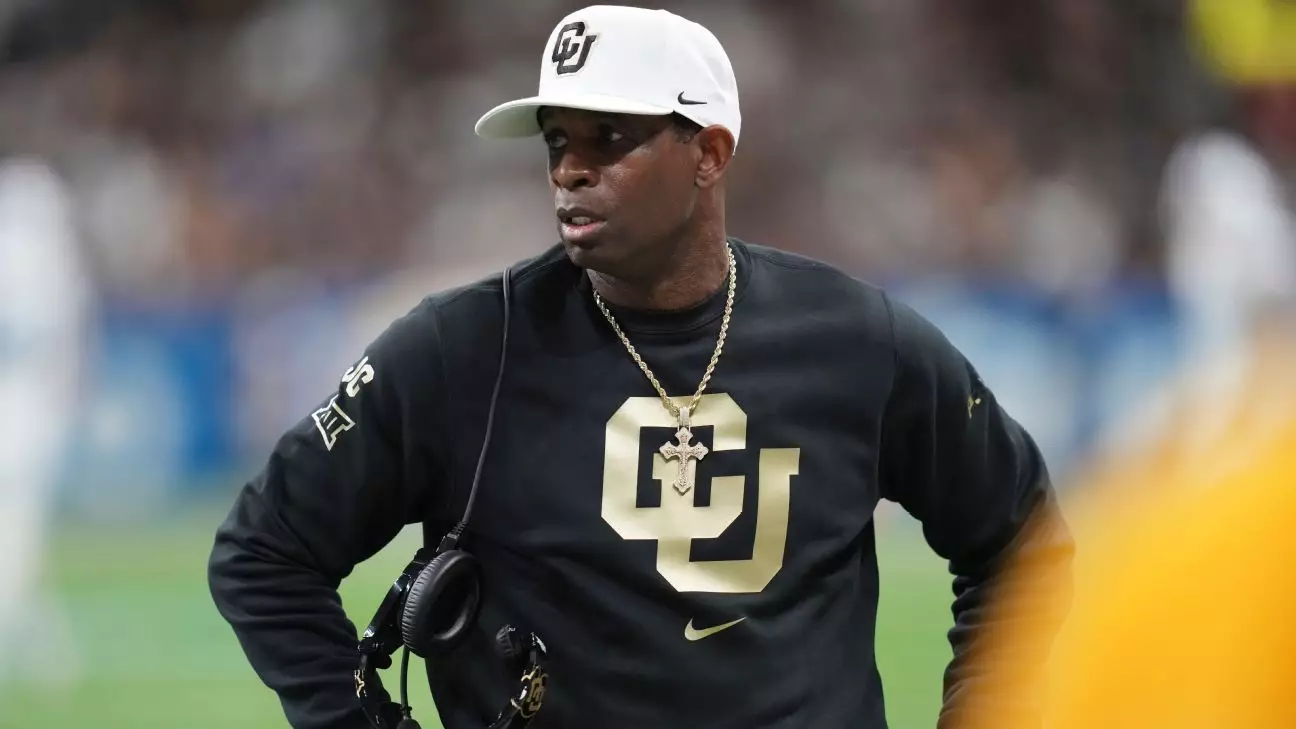The football world has recently been abuzz with talks surrounding Deion Sanders and his decision to remain at the University of Colorado, despite the interest the Dallas Cowboys had in recruiting him for their head coaching position. This narrative resonates beyond mere career decisions; it brings forth complex themes about identity, leadership, and the evolving nature of football itself. Sanders, widely recognized for his flamboyant persona and immense contributions to the sport, has made waves not just on the field but also in the realm of coaching.
Initially, Sanders’ reluctance to jump from college to the NFL might seem surprising. After all, many view head coaching in the NFL as the pinnacle of coaching success. However, during a recent episode of “We Got Time Today,” Sanders candidly shared his apprehensions about the professional game’s current dynamics. He expressed that the style of play and the intensity of NFL practices contrast sharply with those at the collegiate level. This revelation highlights a significant, perhaps underappreciated, aspect of coaching—adaptability to a specific environment.
Sanders claimed, “I couldn’t coach pro ball… the way they practice, the way they go about it, I couldn’t take it.” His words indicate that the very culture and demands of the NFL might stifle his enthusiasm and commitment to authentic coaching. It raises critical questions about the qualitative aspects of coaching in different leagues and whether one’s personal coaching philosophy can thrive in the rigid systems often observed in professional football.
The professional football landscape has transformed dramatically since Sanders’ playing days. In the 1990s, the game was characterized by a fierce, almost primal dedication to the sport. Sanders, alongside legendary teammates like Troy Aikman and Michael Irvin, experienced a league that was hard-hitting and emotionally charged. Today, however, the approach to training, player management, and the overall atmosphere is distinctively different. Sanders’ reflections shed light on these changes and the potential misalignment between his values as a coach and the demands of the modern NFL.
This sense of nostalgia resonates in Aikman’s observations regarding Sanders’ potential fit with the Cowboys. Aikman noted that the organization could benefit from Sanders’ commanding presence—a leader who could instill confidence and a strong sense of direction. However, the sentiments shared publicly by Sanders and his former teammates also point to the evolving standards of leadership in sports. With the growing emphasis on analytics, player health, and corporate interests, it raises the question: Can a traditional coaching style flourish in today’s sports ecosystem?
Deion Sanders has been at the helm of the Colorado Buffaloes for two seasons with a record of 13-12, including a notable 9-4 in the previous year. Under his guidance, the program has witnessed impressive moments, such as cornerback and wide receiver Travis Hunter’s Heisman Trophy win. This track record, while not without its challenges, indicates that Sanders is building something valuable at the collegiate level.
The decision to remain at Colorado speaks volumes about his commitment to fostering young talent and nurturing a culture that aligns with his coaching philosophy. His success in the college arena suggests that coaches like Sanders can find fulfillment and accomplishment in developing players who are on the cusp of entering the professional leagues.
Despite the allure of the NFL and the possibility of prestigious teams like the Dallas Cowboys reaching out, Sanders has consistently displayed a resistance to transitioning back to professional football. He has previously stated on platforms like “60 Minutes” that he would not pursue NFL opportunities, positioning himself instead as a transformative figure in college football. This choice emphasizes his desire not only to influence players on a personal level but also to cultivate a different kind of team spirit and resilience amid the sport’s trials.
The Cowboys, in their decision to promote Brian Schottenheimer instead of pursuing Sanders more aggressively, illustrate a broader trend in the NFL regarding hiring practices and the qualities franchises prioritize in a head coach. The failure to formally interview Sanders raises questions about how traditional norms may be stifling innovative leadership styles that could benefit the game.
Deion Sanders’ journey highlights a nuanced tableau of leadership within the ever-evolving football landscape. His decisions reflect much more than career moves; they resonate deeply with issues of identity, adaptability, and the quest for authenticity in coaching. In a world where the boundaries between college and professional football continue to blur, Sanders embodies the complexity of a coach navigating the contrasting terrains of these two formidable arenas.

